What better prospect than a full day of gaming to end the year? The keys were _definitely_ sorted out, we know how the heating works now, and the circus school were on some kind of Christmas recess which would stop them hampering our plans. What could POSSIBLY go wrong?
Car trouble, that’s what could go wrong. I loaded the trusty shep-mobile with a heap of gaming goodies, got into the driving seat, turned the key and… nothing. Just the briefest grunt from the starter motor, followed by silence and no sign of life. Tried again, several times… it was as dead as the proverbial dead thing.
Woe! … I sat in the car for a few minutes, trying to figure out a contingency plan. I live quite a way out of town (18 miles, to be precise), which made things a bit awkward, and a Saturday morning in the midst of the Christmas/New Year holiday period probably isn’t the best time of year to call out a mechanic at short notice.
Feeling miserable in the face of a missed day of boardgaming, I sent one last, desperate prayer to the meeple gods, and tried the key again.
SUCCESS! – The engine turned over… the car was running! 🙂
Which… sort of put me in a dilemma. Once the engine was running, I was confident I could get to the meeting successfully. But starting the engine to get back? That could be a whole new challenge. Should I risk it??
Yeah, well. The lure of a day full of boardgaming is a strong one. And, lets face it, I’ve paid an RAC subscription for years without needing it; if the worst game to the worst, I’m sure one of those guys could get me home.
Decision made! I was off…
All things considered, I didn’t arrive as late as I might have. There wasn’t many people there yet (but that was perhaps to be expected, given the festive scheduling — we had no idea how popular it would be), a game of Ingenious was underway, but not much else… and I soon fell in with a bunch of fellow late-comers (Dave, John B. and Olly), and the first game of the day was selected…
Survive: Escape from Atlantis
This was a Christmas pressie from Mrs Shep, bought on the strength of my enjoyment of the game at a previous Newcastle Gamers sesh (which I enthusiastically blogged about here). This was actually the third time I’d played my new copy in the space of 4 days, so it’s already earning it’s keep. I’ve now tried it with 2, 3, and 4 players … the two player game is a bit flat, but it’s a really fun gateway/light game with 3 and 4. It seemed a tiny bit odd to be playing this particular game at the start of an all-dayer (I much prefer this kind of thing later on, when my brain is feeling a bit frazzled and bruised), but I think it was enjoyed by all. No idea who won — the early part of the day is already a distant blur — but there was a pleasing level of evilness and betrayal, and I think fun was had by all 🙂
Next: T’zolkin, The Mayan Calendar
T’zolkin was one of this year’s big Essen releases, and I’ve been very keen to give it a go… fortunately, John B. had brought his copy along. Dave decided to go and play Power Grid instead, leaving myself, Olly and John B to play a 3p game.
The main feature (/gimmick) of T’zolkin is a series of interlinked cogs. During the game, you place your workers at certain points on the cogs, and each turn they’re “promoted” through a series of (increasingly powerful) action options by the movement of the mechanism. It’s a pretty cool feature… I mean, the game would function equally as well as a series of linear tracks on a conventional board that you just shoved your men one space forward on every round …but the cogs automate that process very neatly, so although the whole cog thing is very much a gimmick, it’s a justifiable sort of gimmick.
Spinny-cogwheel-gimmick-thing aside, what’s the game like? Well, it seems pretty good, but it’s hard to tell with just one play … there are 20 or so different actions you can perform in an attempt to progress your tribe of Mayans, and it’s very hard to figure out how everything interacts on your first run through … but it seems like there’s a very tight worker placement game buried in there; it’ll just take a few learning games to uncover it. Good stuff. Might need to get a copy of this one myself.
Next game on the table was another of my Xmas pressies:
Galaxy Trucker
Galaxy Trucker is a game that I’ve wanted to own since I first played it in late 2011, but which has been out of print for ages, and therefore spent much of 2012 changing hands at silly prices. Fortunately, a re-print came out at the end of 2012. I was sorely tempted to buy the super-deluxe anniversary edition — which contains all the expansions — but then spotted a post on Board Game Geek saying somebody had dumped a bunch of “basic” versions on amazon.co.uk for a far-too-good-to-miss price. I promptly dropped a hint to Santa (I have it on good authority that Santa loves a bargain!) and — sure enough — the game turned up in my stocking on Xmas day. Good ol’ Santa! 🙂
Olly has played before (in fact, he’s just bought the anniversary edition), but the game was new to John B. Camo also joined our table for this one, and it was his first game too.
Galaxy Trucker is another game that’s a bit lighter/less serious than the stuff I usually buy (a bit of a trend this Christmas!). You build a spaceship from a heap of random components in the middle of the table (all players grabbing bits simultaneously, against the clock), and then cross your fingers and hope that the resulting vessel will survive a trip across the galaxy and collect some valuable cargo for points. More likely, it’ll disintegrate in a meteor storm, be blasted into little tiny pieces by pirates, have its crew kidnapped by slavers, or have all manner of other nasty fates befall it.
It all seems a bit random and unfair at first… but it’s surprising how efficient/well-defended your ship designs become after a little bit of practice. I think John B. was a bit flummoxed — most of his ships didn’t survive very long … and I’m not sure that our optimistic assurances of “well, look on the bright side… at least you’re a MUCH smaller target now” every time that big chunks of hardware fell off his creations really helped to endear the game to him.
By some fickle twist of fate, I was the only player to survive an onslaught by slavers in the third (and most lucrative) round… the other 3 players were rendered crewless and drifting in space, leading to a pretty easy victory for me.
Good game; I’m glad I finally got hold of a copy. I’m sure it’s not a game that’ll be everybodies cup of tea — it can be a touch random and unfair at times — but as long as you don’t take things too seriously, it’s a fun ride 🙂
This seemed like a good point to nip to the shop over the road and grab some lunch. When I got back, this was in the offing:
Steel Driver
I was a bit iffy about playing this one… I’m not a huge fan of 18XX-esque train games, and this one seemed to be struck from that kind of mould — but other folks were keen to play, so I went with the flow and decided to give it a go. Actually, it wasn’t too bad a game — quite a nice gateway-ish slant on train gaming, and a good 4 or 5 hours SHORTER than most games of that ilk, which can only be a good thing ;).
Each round you bid for control of one of six train companies. You then run that company for the round, lay tracks, and earn money. Then the company goes back into the pool, bidding starts again and somebody else will likely get control of it next turn… but you get a “share token” in each company that you operate, and at the end of the game there’s a peculiar set-collection mini-game played out on the final railway networks, which pays out points according to how many shares each person holds in the companies doing the block-picking-up.
Surprisingly, I won … (and yes, I really was surprised… I hadn’t even grasped out how the end-game worked until very late in the day!). I think my success was mostly down to doing focussing on short-gains during the main game, and not worrying how the end-game worked… but — by some fluke — ending up holding shares in companies controlled by players who *had* been worrying about how the end game worked, but not worrying so much about scoring points in the main game. Weird. I bet there’s NO WAY I’d pull that tactic off if I’d tried to do it deliberately(!).
Anyway, t’was far better than expected. I’d happily give it another go.
Next up: Brass
I almost didn’t play Brass. But I’m so glad that I did.
Brass is a game with a reputation… it’s currently number 9 on the board game geek chart (i.e. an extremely highly-rated game) — which is a big point in it’s favour. However, it’s also rated as “Medium Heavy” in terms of complexity, and has a reputation for being hard to learn. I flipped through the rule book once — to try to get a handle on what all the fuss was about — and it didn’t seem like a particularly sexy game; … cotton mills, hard economics, network building, and some kind of non-obvious card-playing system driving it all. It didn’t really appeal to me.
That said, it always occurred to me as a game that I *should* play, at least once, just for sake of my game-discussing credibility… and my interest was at least slightly piqued by the fact that Olly (who usually matches my own taste in games pretty closely) has played it before, and was particularly keen to play it again. So… despite not really being in the mood for anything complex at that particular point in the day, and despite the tide of people running away shouting things about it being way too brain-hurty, I sat down and gave it a go…
(The fact that the only other thing kicking off in the room at that time was a game of Wallenstein might also have been an influence).
Olly explained the rules while Gorden (whose game it was) punched out the tokens (yep, it was a brand new copy!), and everything seemed surprisingly straightforward — nothing like the behemoth of a game that I had in my imagination… OK, there’s quite a lot of rules (and some odd exceptions), but everything seemed to make good thematic sense, and — after some wobbly initial rounds — I had a pretty good idea of what I was doing.
Excellent game… I really enjoyed it. In this one you build a network of industries… cotton mills, coal mines, iron works, ports and ship yards, and railway networks (or canals, in the early part of the game) to connect them all and move goods around. The nice bit is, you don’t score for an industry until it’s actually used… so, for example, if you build a cotton mill, it doesn’t earn cash/VPs until you link it to a port to facilitate sales — the port can be yours, or an unused port belonging to a different player, and when the cotton mill earns points for being connected to a port, the port *also* earns its owner points for being utilised. It’s a very neat approach to supply-and-demand economics; you succeed not only by building stuff that would be useful to you, but also by building stuff that would be in demand by your opponents.
It’s was also a bit of a novelty to play a game set in Lancashire (and a very high-profile game at that!)… By odd co-incidence, I spent a fair chunk of December building a web site for a TV installation company based in the North West, so it was amusing to see all the familiar place names on the board (only a few days after sweating over a chunk of search engine optimisation / geographical ad campaigns for those very same real-life locations!)
I sort of won this one too. I say “sort of”, because in the final reckoning we noticed that one of Olly’s cotton mill tiles hadn’t been flipped (i.e. counted as utilised), but weren’t sure if it should really have been that way up or not (we were getting to that stage in a long day of gaming where silly mistakes start to creep in). The gap between our scores was so close that if it _had_ been flipped, Olly would have won instead. (Then again, in a similar moment of spectacular brain-fart stupidity, I accidentally tossed away a card that would’ve got me a shipyard in the closing rounds of the game and a very nice points boost to go with it. So perhaps the victory was morally justified either way).
We were into the evening hours now, and I was getting hungry again. Another quick dash over the road to sainsburys was in order … my luck was in; they’d just discounted the day’s sandwiches. And the very best kind of sandwich is a discounted sandwich!
As I re-entered the hall, a shout came from the other side of the room inviting me to a game about to start…
Ca$h ‘n Gun$
Ca$h ‘n Gun$ is — basically — a party game about criminals gang sharing the loot of a successful heist. How do criminals share the loot of a successful heist? By pointing guns at each other, of course! …so the game involves pointing foam-rubber guns at other players, lots of bluffing, and strategic stand offs. Truth be told, I’m not a huge fan, but it doesn’t take long to play, and it was something easy to do while I nibbled my sandwich and recovered from playing Brass.
I didn’t do particularly well, but went out in a blaze of glory by shooting the guy who was holding a grenade (sorry Dave!) — thereby ensuring that anybody who mistakenly thought I was bluffing (and therefore didn’t duck) would be taken out in the blast. I realise now that this might have been interpreted as some kind of deliberate suicidal king-making and/or spite move, but I was really just trying to shake up the final round a bit, since at this point there were some very obvious winners and very obvious losers, and it struck me that I could disrupt that a bit and inject some last-minute uncertainty (though probably die in the process). Still, it’s hard to be upset/offended by the outcome of a game this light, so hopefully nobody took the hump 🙂
Last game of the night:
Upon A Salty Ocean
The last game of the night, and also the last of my three new acquisitions (and also the only one of the three that I hadn’t played before!). The game is set in 16th Century Rouen, and involves ship-building, fishing and trading, in an attempt to become the richest merchant and impress the king. Along the way you mine salt (to preserve fish), buy various buildings in the town to secure perks, and worry about bad weather, pirates, and stuff like that.
Board Game Geek rates this as a medium-weight game… and yeah, the rules are pretty easy to grasp — but _playing_ the game is another matter; it’s an unashamed economic euro cube-pusher, unforgiving of bad decisions, and quite mathy (especially in the closing rounds). This is mostly down to the fact that your money also serves as your victory points, AND as your action points… so you can very easily spend all your victory points away on new actions, and fail to keep enough of them in reserve to score points at the end of the game(!). If you like economic games with the training wheels taken off, it’ll probably be right up your street. For my own tastes… I’m not so sure; I like my economic games to be a bit gentler, and think this one will be going on my trade list.
* * * * * *
The time was creeping towards 11pm, and I was starting to think that I should face up to the looming problem of seeing if my car would get me home… so decided to call it a day.
I got into the shepmobile… gingerly turned the key… and — Nothing. Then I noticed the heater was on — turned that off, and then switched off the radio too for good measure, a combination of which gave me *just* enough juice to crank the engine… ‘Phew!
So it was a good day’s gaming, all told. There was a decent turn-out in the end; about 30 people showed up (4 first-timers!), and I got through 7 games in total. All three of my new acquisitions got played, I crossed another title off my “things I’ve played in the BGG top 10” list, and I got to see whether T’zolkin lives up to the hype. (Answer: Yes, it probably does).
Best bit: Brass. Really impressed by this game, and very keen to play it again.
Worst bit: Car grief… though fortunately I didn’t need to resort to using the RAC taxi service, and the problem was rectified the next day by a quick dash to Kwikfit for a new battery 🙂
CREDITS: Session pics stolen from Olly. Newcastle Gamers meets on the second and last Saturday of the month. Usual cost is £3 (or £1 for concessions), but your first visit is free … check our G+ group for more info.

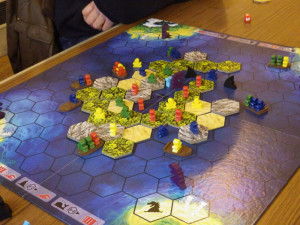
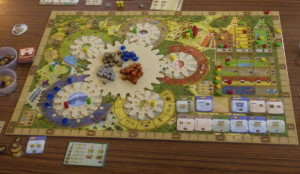
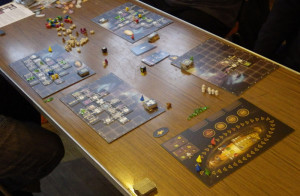
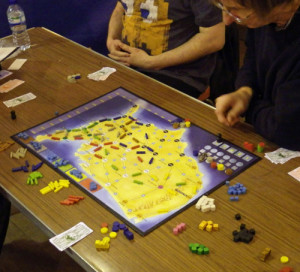
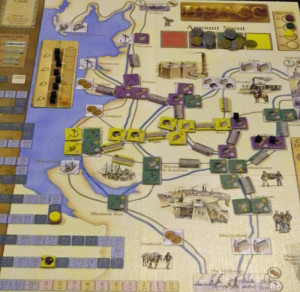
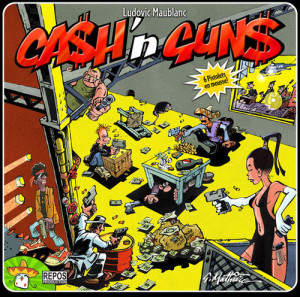
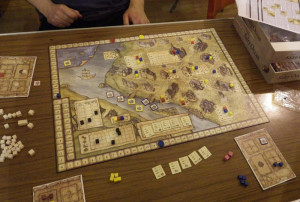
 Follow
Follow